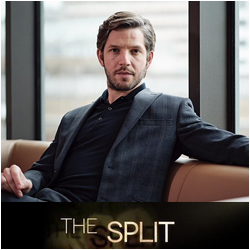TIGER RAID Review: Head spanglingly immersive, pitch black but beautiful and hauntingly profound

© Dixon Baxi Evans
Fair warning: this review contains spoilers!
It has been two years since news reached us of Damien appearing in a film shot in the Jordanian desert.
We’ve excitedly waited on the sidelines as the movie premiered at film festivals across the world, enjoyed promos, trailers, sneak peeks and treats.
After months of eager anticipation, Tiger Raid has at last been unleashed in the UK. To say there were expectations would be an understatement.
But no words, no amount of anything, could prepare for watching the film – an extreme, immersive, breath holding, visceral, all-consuming experience, that is so much greater than the description, or sum, of its phenomenal parts.
Damien and Brian Gleeson star as Paddy and Joe, two mercenaries on a mission to carry out the kidnapping part of a ‘Tiger Raid’. We meet them en route, riding a jeep across the desert night, wearing painted on bandit-like black masks. The pair are working together for the first time and begin the job with mutual distrust. Teasing and testing each other, they immediately engage in a dangerous, relentless, psychological dance.

© Dixon Baxi Evans
Set in the war-torn Middle East, against a vast and empty backdrop, the film’s opening has an almost apocalyptic feel, and as they begin to converse, the words of the two men could be as a result of some ‘new world order’. But the action is not set in the future, this is now, and the context Paddy and Joe exist within, overseen by an invisible boss ‘Dave’, has its own rules. But they each have their own versions of reality within that world, and as they collide and constantly challenge each other, a sparking kinetic energy continuously grows between them. It’s an increasingly chaotic and ‘volatile situation’, an intense and suspenseful roller coaster.

© Dixon Baxi Evans
Both highly skilled pros, their dehumanised, terminator-like swift and efficient killing expertise is quickly established when they arrive at a checkpoint and gun down every man on sight. Enjoying it like a sport, sharing an unspoken understanding, the power struggle between the two men is less a professional one (their competence is not in question) than a testing of their values within a violent, dark and deadly world.
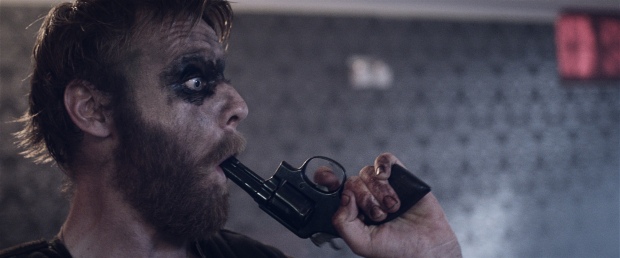
© Dixon Baxi Evans
Joe is fierce, troubled, and frighteningly unpredictable. Working for Dave for longer than Paddy and self sacrificingly loyal, he tries to assert his seniority and experience over the younger man. Pushing and testing Paddy’s boundaries, bragging about killings and torture, joking about rape, Joe is not just offensive, he is a monster. Declaring he also killed his former working partner Ruby, he holds it over Paddy like a threat. But his story keeps changing, and as he presents different versions of the truth, while haunted with flashbacks and visions of a former lover Marylyn, it soon becomes clear just how unhinged he is. But Joe is also the source of most of the film’s dark humour and is strangely and uncomfortably almost likeable. Despite his deceptions there is something honest about him too, “a clown with a gun.”
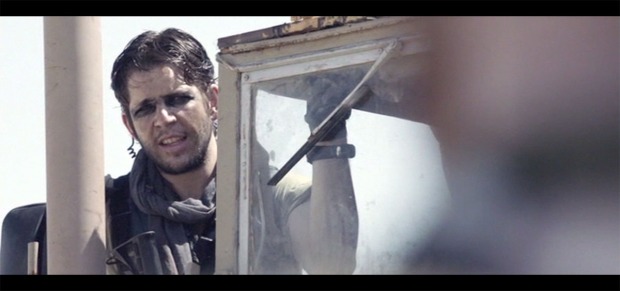
© Dixon Baxi Evans
Paddy is cocksure, highly ambitious, “I think I’ve a lot of contemporary ideas to offer”, and convinced of his invincibility, “I’m superman”. Charming and goading, he meets every challenge Joe throws his way and counters his displays of greater experience by mocking the older man’s blind faith in Dave.
At first Paddy appears to be the more stable of the two, with one foot in the sanity camp and more of a moral code, even a conscience, not going along with Joe’s most offensive jokes. He even appears romantic and love struck when he talks about an ex lover; “She was beautiful. She was perfect. Like proof God exists.” In the psychological game of chess between the two men, Paddy at times refuses to play and his version of reality within this crazy world seems less distorted than Joe’s.
They are both in fact pawns for Dave, the omnipotent but never seen or heard (by us) man with the masterplan, who intermittently makes radio contact to change up the rules as he likes, playing with the men as his own toys in his own game.
Before the kidnapping takes place, Paddy receives orders from Dave via his ear piece to kill Joe at the end of the job. As the raid progresses Dave’s machinations cause more twists and turns, and create more layers of secrecy between the two men, adding to the already menacing undercurrent.
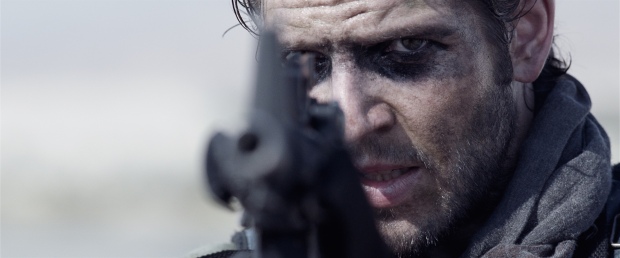
© Dixon Baxi Evans
Finally arriving at a palatial location, the home of their kidnappee Shadha (Sofia Boutella), daughter of a powerful and very rich businessman, the pair spring into action, quickly dispatching a guard. With Joe insisting upon “professional standards” while chopping up the body with an axe (off screen), the dark humour is both difficult to watch but impossible to look away from, in the most suggestively gory and irresistibly funny scene of the film.
Shadha is captured with ease and slick professionalism, gagged, tied to a chair and beaten by Joe. She is not only the victim of the operation, but also becomes another piece on the board in the increasingly sickening game between the two men.

© Dixon Baxi Evans
After Paddy and Joe discover her true identity as the woman Paddy had earlier divulged was his one true love, a series of revelations unfold. The scales begin to tip from a volatile to direful situation and the tension ratchets up even higher as the two men begin to turn on each other.
Joe begins to unravel, just how lost he is, the extent of his obedience to a faceless authority, and his own captivity to the code of his own distorted paradigm, all becoming clear when his truth is eventually uncovered – Marylyn was in fact Ruby, who he loved but believed he had to kill. His repression and the price he has paid personally makes him more tragic, even vulnerable.
Where Joe’s confession brings a glimmer of hope for redemption, it is not so for Paddy, who, Shadha reveals, has a hidden sadistic nature. As she utters the words, the realisation of the depths of Paddy’s delusion, and an awareness of his true darkness, begins to creep insidiously in – his earlier apparent morality a facade, and his self deception sociopathic.

© Dixon Baxi Evans
Their black painted eyes become symbolic, not only of how the two men look out at the world, but also of the masks they hide their truths behind (even to themselves.) As the makeup is slowly removed, in Paddy’s case almost completely as Joe nearly drowns him in a water trough, both men are exposed.
These last twists result not only in almost a switch of sympathies for Paddy and Joe, but also a growing sense of inevitability that neither could walk away from this.
Throughout the film the close-up intimacy of the drama between these dark souls taking place against an empty, unending background, gives the feeling of them being on the edge of life (and on the edge of their lives). Where in the beginning the checkpoint appears as the entrance into a world between life and death, like the gates of purgatory (where they killed the gate keepers), in the end scenes, presented with ghosts from their pasts and with their demons revealed, Joe and Paddy approach their final judgement. There becomes a sense that both were damned from the start, with no way back.
Doubly trapped, by the ties that bind her and Paddy’s scarily warped vision of their love, Shadha is defiant in the face of her captivity. Cutting through Paddy’s domineering delusional fantasy, “fuck love”, she reclaims her power, ending it in perhaps the only way it can be ended.
The final shocking events (and in Paddy’s case also sudden) are not predictable, but within the context and warped moral code of their world, it could be said that both Joe and Paddy meet the perfect punishment. Perhaps Shadha is proof, after all, that God exists.
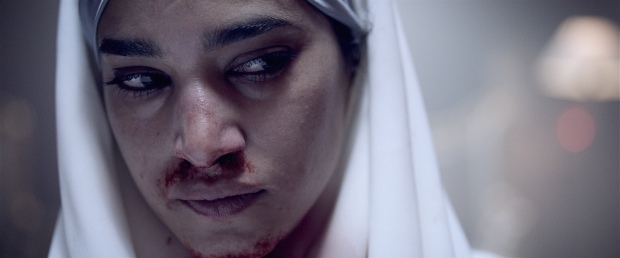
© Dixon Baxi Evans
It might be tempting to assume that the film’s climax is the only moving part, but this is not the case. Despite being undeniably dark and very disturbing, there is also something overwhelmingly profound and beautiful, emotionally powerful and pure about it from the outset. The hauntingly penetrating score and the photography, delivering sweeping panoramas, and close-ups, magnifying and contextualising the characters’ inner and outer worlds, heighten the beauty that both transcends and permeates the whole journey. There is a moment at the beginning when the sun rises over the desert and the score is potently sublime, other worldly, almost celestial, echoed in the very final scene as Shadha steps out free from captivity into the light. These are not religious themes but they speak to the deeper, even poetic, soul of the film.
The performances are both vivid and subtle, all three actors embody their characters utterly and completely. Damien and Brian Gleeson imbue Paddy and Joe with vibrant and shifting shades, evoking emotion for these characters, in places where you shouldn’t find yourself moved at all. But their journey, their revelations, their damaged, hidden hinterlands and histories, lay heavily, even painfully, in the heart.
Adapted from Mick Donnellan’s play Radio Luxembourg, the tonal and tense, multi-layered, intelligently constructed story translates to the screen seamlessly, the largely two person plot ceaselessly compelling and absorbing. The story and character arcs are so richly textured, they are almost impossible to entirely compute in one viewing. The film’s essence remains and its meaning continues to unfold long after it is over.
An up close uncategorisable character piece with strains of psychological thriller, this intimate yet immense film also oozes quality and creative integrity from edge to edge. It’s incredibly performed, beautifully made by first time director Simon Dixon, stunningly shot by Si Bell, and Dean Valentine’s deliciously permeating score is both impactfully pulsating and exquisitely sublime. Part of the film’s power is down to this synergy and the care in every heartbeat of the film from performance to production.
Very much an Indie and with nothing manufactured, mainstream or mass produced about it, this is far from easy, end of the day, escapism. But it is an alive, artistic, affecting experience. And It deserves to be experienced.
To repeat an earlier sentiment, no words could explain Tiger Raid because they will not be enough to convey the experience of it. However tempting it might be to try to reference it to another film, there really is no film quite like it.
Head spanglingly immersive, pitch black but beautiful, hauntingly profound, moving, brave and indelible, Tiger Raid is so worth the wait and more than worth the watch.
So watch it – November Oscar Whisky f***ing NOW.
DMF rating: ★★★★★
Tiger Raid is available in the UK on VOD platforms and on DVD now.
Have you seen Damien in Tiger Raid? Vote in the poll and join the conversation with other fans at the forum, here!












